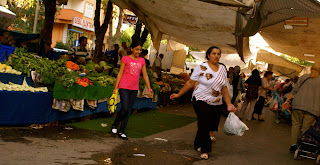 |
| Pickles at Pazar |
On Fridays, streets in my parent's neighborhood are closed for traffic from dawn till dusk. The reason for that is that it's the day of the bazaar (pazar). For every day of the week, there is a pazar in a different town, and pazar dealers travel with their merchandise -be it home products, grocery or clothing - and open their stands and tents serving the people of that neighborhood until they come back again the following week. Today, it is our neighborhood's turn.
 |
| Mirror provided for a try-on |
You can find anything in pazar and for very cheap. I rushed through the stands bumping into carriers dragged behind fat mothers, looking for my favorite Made-in-Germany tweezers: 2 liras. I then rushed to find my friend Volkan his favorite sweat-free socks: 3 for 5 liras ("5 liras, only for you Abla!"). I found a nice fancy blouse for my mom: 20 liras and a few hairclips for myself: 1.5 liras. I then rushed to get some Adana eggplants and some fresh parsley: 6 liras. I wanted to get pots for my kitchen but he didn't have the size and the color I wanted: "Come next week, Abla!".
The fun part of pazar is watching the relationship between the vendor and the customer. Vendors come up with creative ways of selling their stuff like: "Don't be shy Abla, get a bra for yourself, make your mother-in-law jealous, your husband happy!!". Everybody knows each other; customers have been living in this neighborhood for decades and the same vendors have been putting up their tents and stands every Friday for years. And this makes everyone somehow related to each other. Depending on your age (or how hot you look), you are either a Yenge (sister-in-law), a Bacı (younger sister), Abla (older sister) or Teyze (Auntie). Men get their share too, but they are either Dayı or Amca, both meaning uncle, but Dayı somehow reflecting a younger age. I think.
 |
| Grocery section at Pazar |
You can spend hours in pazars. At age five, it was a frightening place to be, you can easily get lost in the crowd and start crying for your mom (largely because of this miserable "let's go to pazar" song trying to teach you what to eat: happuru huppuru eat chicken, happuru huppuru not eat cat). At age ten, it is the only activity you can enjoy without your mother constantly looking for you. Come fifteen, you start carrying bags behind your mom, seventeen you carry more and at twenty, you avoid coming home early on Fridays. At my age? You look for tweezers.


























